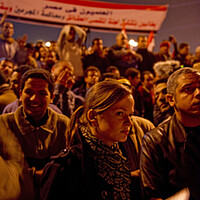Protesters attack Muslim Brotherhood headquarters in Egypt
Loading...
| Cairo
A small crowd attacked the headquarters of the Muslim Brotherhood in Cairo this evening as elsewhere in the capital large crowds called peacefully for President Mohamed Morsi, a former Brotherhood leader, to step down.
A crowd made up largely of young men threw Molotov cocktails and rocks at the headquarters, a new villa that had been a major upgrade from the Brotherhood's pre-revolution digs in a dingy Cairo apartment. The petrol bombs burned parts of the building, though did not catch the entire structure on fire. As of two hours from publication, members of the crowd were trying to break into the building but had not yet managed to breach it. Gunshots rang out in the darkness for several hours as police were nowhere to be seen.
The attack took place as large crowds throughout Egypt went to the streets to demand Mr. Morsi's resignation. A year after he took office as Egypt's first freely elected president, anger and discontent is widespread. And as anger has grown, so has violence against the Brotherhood, a group suppressed by the former Egyptian regime of Hosni Mubarak.
Dozens of its local offices have been attacked or burned down, including several in recent days. Brotherhood supporters are among those killed in clashes between the president's supporters and opponents in recent days in the Nile Delta. Four people were killed today in Assiut and Beni Suef in clashes outside the local offices of the Brotherhood's Freedom and Justice Party, according to local media. It was unclear whether they were supporters or opponents of Morsi.
One man who watched the attack on the Brotherhood headquarters said the violence is justified because group, and Morsi, could not be removed from power through elections. "How can we hope in politics?" asked the man, who gave his name as Saad. "They took power by force. We have to force them out."
Morsi became Egypt's first freely elected president a year ago when he won 51 percent of the vote. But Saad said Morsi has damaged Egypt so much in one year, that it was impossible to wait another three to vote him out of office.
"They want to kill us," said another man when asked why he wanted to break into the headquarters. "They're choking us."
Other bystanders disagreed with the violence. It appeared that birdshot was fired into the crowd from inside the besieged building. It was unclear if gunfire was also coming from the crowd. Several young men stumbled away from the area with birdshot wounds to their faces and bodies. One got in a waiting ambulance for treatment before his friend pulled him out, shouting at him that he would be arrested if he went to the hospital.
As some in the crowd attacked the front entrance of the Brotherhood's building, others had a different idea. "Around to the back, there's an entrance there!" shouted one man, and a crowd followed him as they left to find the back entrance and attempt to break into the building from there.
Egypt's army has warned last week it would intervene if Egypt descended into chaos following the demonstrations.
A Brotherhood spokesman, Gehad El Haddad, said on Twitter that a group of “thugs” was attacking the headquarters, and said two police captains left their posts protecting the headquarters to join the attack. No eyewitnesses reported seeing police engage in the attack. But Morsi has struggled to bring the security forces, long used for suppressing the Muslim Brotherhood, under his control. The police's refusal to protect the Brotherhood headquarters and other Brotherhood offices are a telling sign.
One bystander rejected the Brotherhood spokesman's notion that those in the crowd were paid to attack the building. "Are all these people thugs?" he asked, as he gestured at the packed street, mostly filled with onlookers. "Those inside shooting are the thugs."
The Egyptian daily Shorouq posted a video on YouTube showing men on top of a Brotherhood building in Gharbeya province, in the Delta, firing on a crowd with shotguns. In December, the Brotherhood sent its members to the presidential palace to disperse an opposition protest there, some members of which had attacked the palace gates with Molotov cocktails. Brotherhood supporters captured, beat, and detained some protesters for hours, according to protesters and videos that appear to show Brotherhood members interrogating protesters and urging them to confess they were paid to attack the palace.






